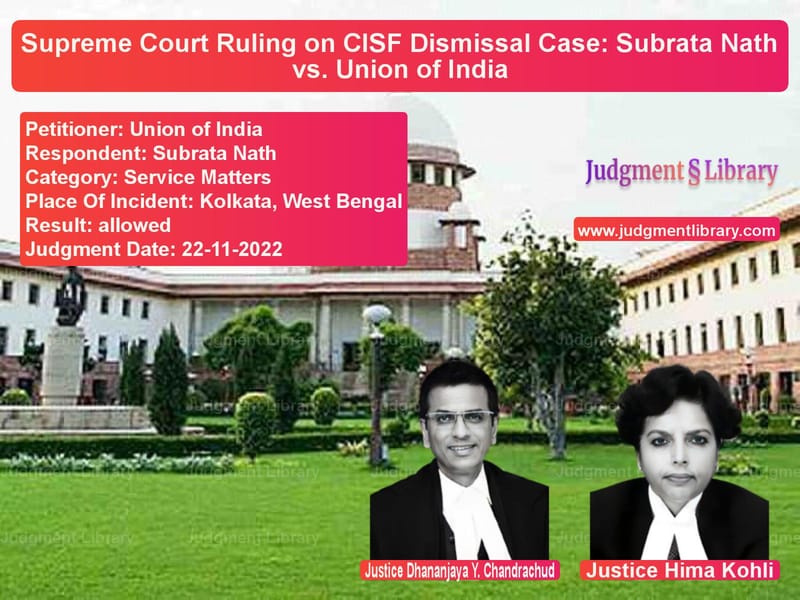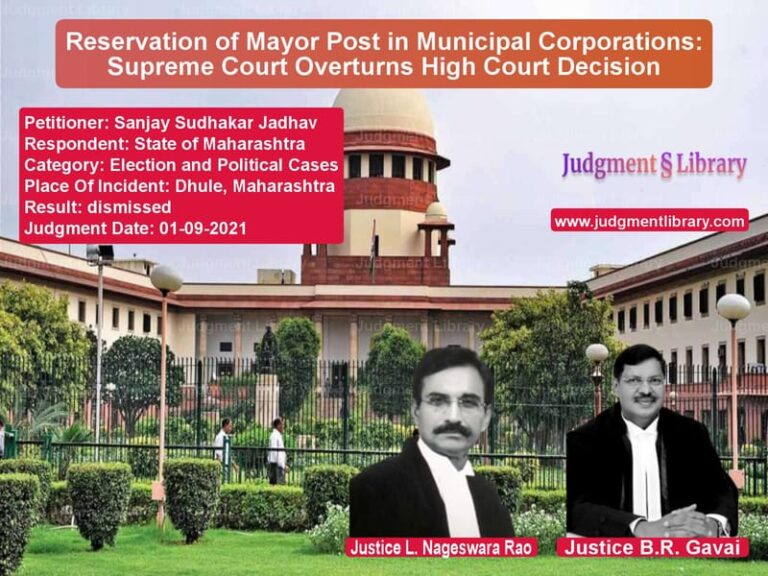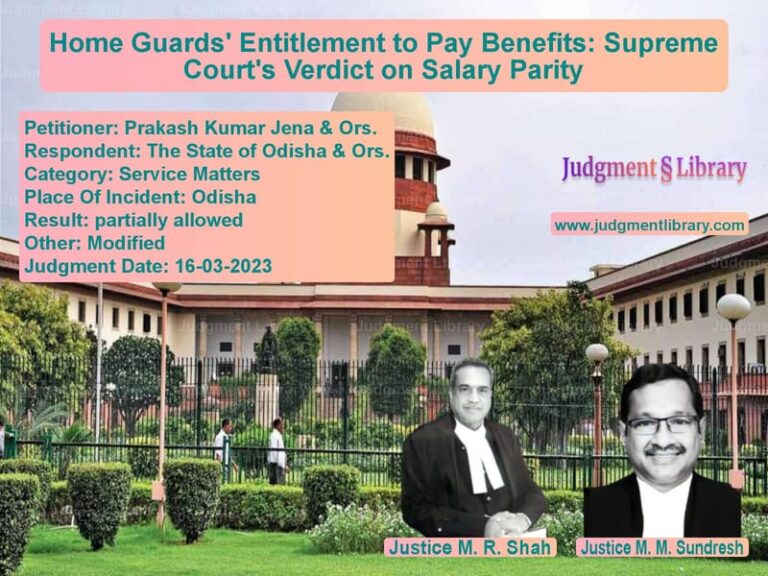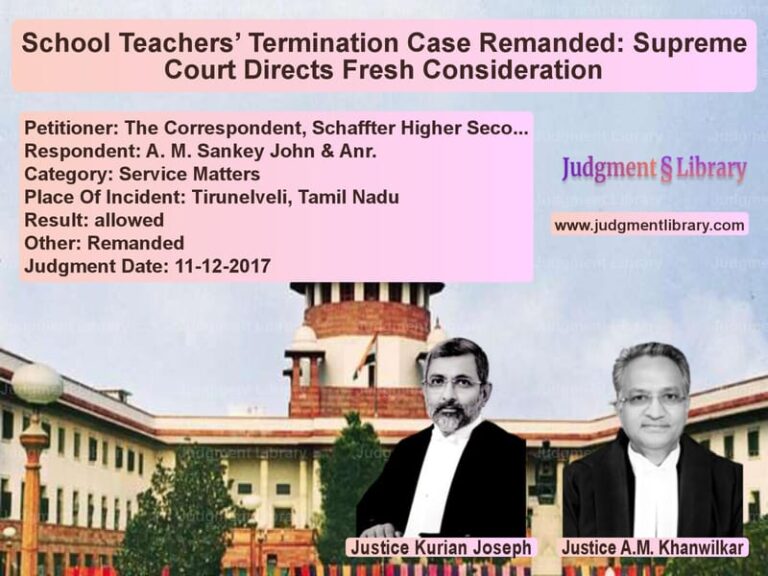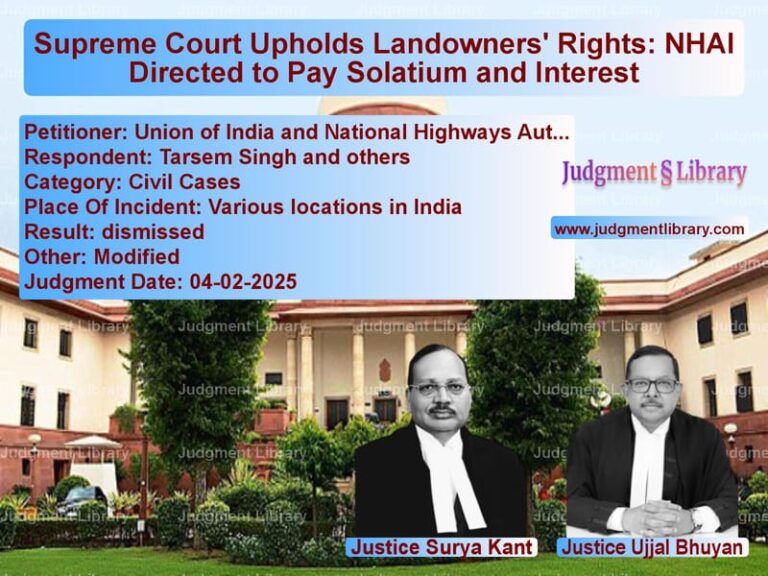Supreme Court Ruling on CISF Dismissal Case: Subrata Nath vs. Union of India
The case of Subrata Nath vs. Union of India involves a disciplinary action taken against a CISF constable for alleged negligence and repeated misconduct. The Supreme Court had to determine whether the dismissal of the constable from service was justified and whether the High Court was correct in directing his reinstatement with full back wages.
Background of the Case
The respondent, Subrata Nath, was a constable in the Central Industrial Security Force (CISF) and had been in service since 1994. On 7th November 2007, while on duty at the Alif Nagar Scrap Yard in Kolkata Port, a theft of approximately 800 kg of copper wires occurred. The local police intercepted a truck carrying the stolen wires and informed CISF about the incident.
Following this event, Subrata Nath was placed under suspension and charge-sheeted on 7th December 2007. The charges against him were:
- Charge I: Gross negligence and dereliction of duty for failing to prevent the theft.
- Charge II: Repeated instances of misconduct over his 13-year service, having been punished on eight prior occasions.
After an inquiry, the disciplinary authority found both charges to be proven and ordered dismissal from service on 27th November 2008. His appeals before the Appellate Authority and the Revisional Authority were dismissed.
Legal Issues
- Did the disciplinary proceedings adhere to the principles of natural justice?
- Was the punishment of dismissal proportionate to the alleged misconduct?
- Did the High Court have the authority to interfere with the disciplinary authority’s decision?
Arguments by the Petitioner (Union of India)
The Union of India presented the following arguments:
- The theft occurred during the respondent’s shift, and he failed to report or prevent it.
- Evidence from multiple prosecution witnesses confirmed that he was found alert at his post but failed to take action.
- The respondent had a history of repeated misconduct, having been penalized eight times.
- The disciplinary proceedings were fair, and the findings were based on evidence.
- The High Court exceeded its jurisdiction by interfering with the disciplinary authority’s decision.
Arguments by the Respondent (Subrata Nath)
Subrata Nath, through his counsel, countered the allegations with the following arguments:
- He had been checked nine times by officers during his shift and was found to be alert.
- The FIR stated that the theft occurred at 3:30 PM, which was outside his duty hours.
- His past misconduct was unrelated to the current charges and should not have been considered.
- The disciplinary authority failed to consider key pieces of evidence in his favor.
Supreme Court’s Observations
The Supreme Court examined the case and made several key observations:
“The disciplinary authority is the sole judge of facts. If an inquiry is conducted fairly and findings are based on evidence, the Court should not interfere.”
On the issue of the timing of the theft, the Court held:
“The inconsistencies in the FIR do not negate the overwhelming evidence showing the theft occurred during the respondent’s duty hours.”
Regarding the respondent’s previous misconduct:
“A history of repeated misconduct is relevant in determining the appropriateness of dismissal.”
Judgment Outcome
The Supreme Court allowed the appeal and restored the order of dismissal, ruling:
- The High Court erred in interfering with the disciplinary authority’s decision.
- The disciplinary proceedings followed proper procedure.
- The punishment of dismissal was justified given the nature of the misconduct.
Key Takeaways from the Judgment
- Disciplinary authorities have wide discretion in determining punishment for misconduct.
- Courts should not interfere with disciplinary proceedings unless there is a gross miscarriage of justice.
- Repeated past misconduct can be a valid ground for dismissal.
- Public sector employees, especially those in security services, are held to higher standards of accountability.
Conclusion
The Supreme Court’s ruling reaffirms the principle that judicial review in disciplinary matters is limited. The judgment underscores that security personnel must uphold the highest standards of duty, and failure to do so can result in dismissal.
Petitioner Name: Union of India.Respondent Name: Subrata Nath.Judgment By: Justice Dhananjaya Y. Chandrachud, Justice Hima Kohli.Place Of Incident: Kolkata, West Bengal.Judgment Date: 22-11-2022.
Don’t miss out on the full details! Download the complete judgment in PDF format below and gain valuable insights instantly!
Download Judgment: union-of-india-vs-subrata-nath-supreme-court-of-india-judgment-dated-22-11-2022.pdf
Directly Download Judgment: Directly download this Judgment
See all petitions in Employment Disputes
See all petitions in Disciplinary Proceedings
See all petitions in Termination Cases
See all petitions in Public Sector Employees
See all petitions in Judgment by Dhananjaya Y Chandrachud
See all petitions in Judgment by Hima Kohli
See all petitions in allowed
See all petitions in supreme court of India judgments November 2022
See all petitions in 2022 judgments
See all posts in Service Matters Category
See all allowed petitions in Service Matters Category
See all Dismissed petitions in Service Matters Category
See all partially allowed petitions in Service Matters Category

